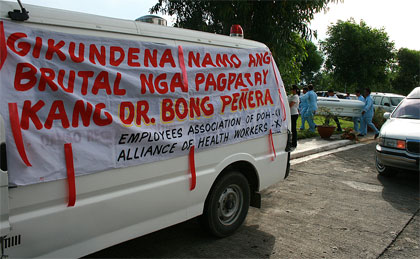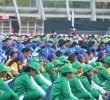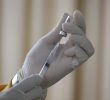
Colleagues of Dr. Pe�era condemn his killing. (davaotoday.com photo by Barry Ohaylan)
DAVAO CITY (davaotoday.com) � While more health workers chose to go abroad to look for greener pastures, Dr. Rogelio �Bong� Pe�era, 45, opted to stay. But on June 24 this year, his killers took his life.
According to his older brother Carlos Pe�era, Dr. Bong found fulfilment in �public health.�
�Unlike his old classmates who now live in first-class subdivisions, he only live in a modest subdivision,� Carlos said. �Even the blue Honda Civic he was driving was second-hand. He was not the kind of person who took advantage of other people.�
Dr. Pe�era was on his way home in Cabantian, Buhangin when unidentified motorcycle riding men shot and killed him. His 15-year-old daughter who was with him survived the attack.
His colleagues described him as �humble,� �quiet� and �peace-loving.� That is why his family and friends could not believe why he was killed.
Carlos said he learned from the neighbors that men aboard an L200 vehicle had been asking about his brother a few days before he was killed. Dr. Bong was a member of the Board of the Urban Integrated Health Foundation Incorporated, a council member of Bagong Alyansang Makabayan and a convenor and chair of the Katawhan Kontra Kartel, three organizations which appeared on the military Order of Battle list that Bayan Muna Rep. Satur Ocampo leaked to the media in May. Military officers in the region denied that such a list existed.
But Dr. Pe�era�s brother said he could not believe the police reports, linking the motive of the killing to a possible �grudge� against his brother.
Dr. Jean Lindo, a member of the doctors� group Rx for Peace, said that amidst the continuing migration of doctors out of the country, Pe�era�s death was a big loss. �Those who are staying behind are already making affordable packages just to make health care accessible to the people,� Lindo said. �And now, they�re being killed.�
Filipinos suffer from the lack of nurses and doctors on top of the inadequate and unaffordable medicines, supplies and health services, the Alliance of Health Workers report said.

Liane grieves over the loss of her father. (davaotoday.com photo by Barry Ohaylan)
According to a paper released by AHW last year, more than 9,000 doctors have already left the country as nurses from 2002 to 2005. The group also monitored 200 hospitals which completely closed and 800 others which closed partially from the year 2003 to 2005 because of lack of doctors and nurses.
The report pointed out that despite the country exporting tens of thousands of nurses, seven out of 10 Filipinos are dying without access to health personnel.
This year, the DOH increased its budget for health facilities enhancement program by 22.29 percent to 2.03 billion pesos from only 1.66 billion pesos last year.
But Dr. Geneve E. Rivera, secretary general of the Head, said a huge chunk of the budget is earmarked for specialty hospitals such as Lung Center of the Philippines, the National Kidney and Transplant Institute, Philippine Children�s Medical Center. These specialty hospitals have been scheduled for integration as the Philippine Center for specialized health care in line with the government�s medical tourism program.
She said that public hospitals and health centers catering to the poor and the general public are not getting the same amount.
�Public hospitals and government-run health facilities are in a state of disrepair and lack adequate facilities,� Rovera said.
Having a doctor in the family was a �pride,� said Carlos. Their father was among the first batch of overseas workers to work abroad. His earnings sustained the education of his children, including that of Dr. Bong�s.
Dr. Bong took up medicine at the Davao Medical School Foundation where he became a member of Alagad sa Maayong Panglawas or Alamapa, a people- organization of health science students fighting for accessible and affordable health care. He joined the Department of Health (DOH) in the early 90s.
�He chose to work with government to prove that one can still work for the government to show concern to community�, said Dr. Ruben Robillo, chairperson of doctor�s group Rx for Peace.
Dr. Bong enjoyed going to depressed areas. In 1998, he was in a team who responded to a measles outbreak in Pigalungan village in the city�s Marilog area. They had to walk four hours before reaching the village, where they gave out medicines and measles vaccines. Their arrival helped save the lives of children in the village. He also went to far areas of Maragusan, Boston, Banganga, among others.
On June 12, Dr. Bong joined a three-day community health work even though it was a holiday, his brother said.
Dr. Pe�era was scheduled for a two-year specialization study in the University of the Philippines in Manila but his trip was deferred because of the AH1N1 pandemic. He headed the DOH epidemiology surveillance unit in the region. (Grace S. Uddin/davaotoday.com)
Extrajudicial Killings







